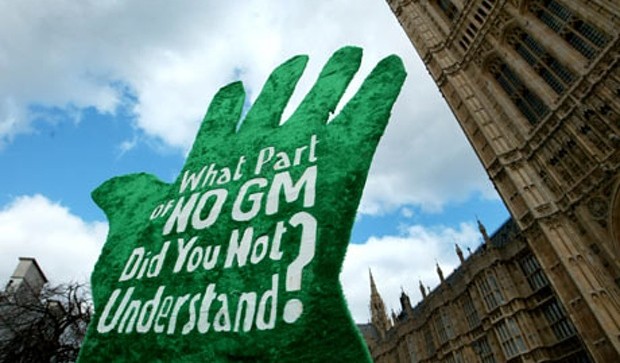June’s European Parliament plenary saw five different votes related to GMOs. Altogether they give a good idea of the European Parliament’s very coherent opinion on GMOs, which can be summarized as being a resounding no.

Source: www.greens-efa.eu
The Authorization Process for Imports is Not Democratic
Two objections to the authorization for import of a GM carnation and a GM maize[1] were voted on Wednesday. These were the 5th and 6th objections (all initiated by the Greens/EFA) that have been submitted to the plenary since December 2015.
The objections’ main message is that the EP does not consider the decision-making process for the authorization of food and feed GMOs as democratic. The special committee of experts from EU member states failed to reach a qualified majority and the Commission has reacted to situations like this in the past by bulldozing the authorization through without the support of the Member States. This should be the exception[2], but with GMOs it has always been the rule.
The maize is also glyphosate resistant, which makes its authorization particularly untimely given the lack of a qualified majority of Member States in favour of the reauthorization of this herbicide (possible carcinogen and possible endocrine disruptor). Unfortunately these objections are not binding on the Commission, but we hope that Mr Juncker will finally propose a new decision-making process as promised to the European parliament in 2014.
No GMOs in Africa
MEPs don’t want GMOs imported into the EU, so it is only logical that they also oppose promoting GMOs in Africa. But that’s precisely what is happening through the so-called New Alliance for Food Security and Nutrition in Africa (NAFSN). This public-private partnership was launched in 2012 under the auspices of the G8 and aims to leverage private investment in agriculture in order to improve food security and nutrition in Sub-Saharan Africa.
NGOs have repeatedly criticized this scheme for fostering land grabbing, limiting seed freedom where it is most needed (farmers must be able to reproduce their seeds themselves instead of buying them every year), but also for pushing GMOs down the throat of African farmers. Just to be clear: Introducing GMOs into the environment raises serious problems for any farmer who wants to keep their farm GMO-free, as these organisms spread uncontrolled in nature.
The EP’s report voted on Tuesday (whose rapporteur is Maria Heubuch, Green MEP) makes all these points and opposes any promotion of GMOs in Africa with European taxpayers’ money. The draft report had prompted accusations of neo-colonialism from Monsanto, which is quite ironic, as industry has been exploiting the New Alliance in order to change African legal frameworks on land ownership, seeds and GMOs for their own benefit. Up to you to judge who is the neo-colonialist!
“Old” GMOs Leave by The Door but “New” GMOs Want to Come in The Window
The agroindustry has been advocating over the last 3 years that their new biotechnologies (so- called “new breeding techniques“) don’t need to be controlled under the current GMO regulation. But the fact is that the products of these techniques clearly meet the definition of “genetically modified organisms” given by Directive 2001/18. They also carry risks similar to the ones posed by current GMOs (transgenesis) and also some new risks that need to be assessed prior to any discussion on their release in the environment. And if they were finally used in fields, they would need to be traceable and labelled to allow farmers and citizens to be able to make a choice. The Commission is due to give a legal interpretation on this very issue sometime this year.
Two reports initiated by MEPs, Jan Huitema’s report on innovation in farming and Anthea McIntyre’s report on technological solutions for agriculture, deal with this issue, initially calling essentially for deregulation. But both texts were heavily amended[3] by the Parliament, who refused to open the door to untested, unlabelled GMOs in the EU.
For the Greens/EFA, the challenges posed to agriculture will not be solved through GMOs or fancy technological tools, but by converting to agro-ecological systems. The EU should fund research on classical plant breeding adapted to these systems, rather than pouring 67% of its agriculture research budget into biotechnology.
[1] Maize Bt11 × MIR162 × MIR604 × GA21
[2] Notably, the Commission has refused to do so with glyphosate
[3] M. Huitema’s report through compromises before the vote, Ms McIntyre’s report through changes during the plenary


















